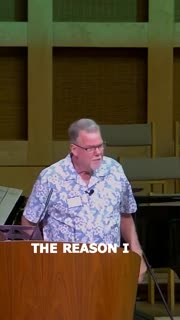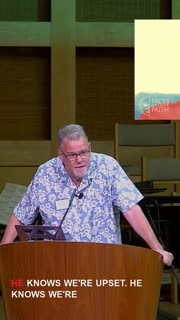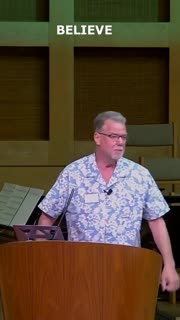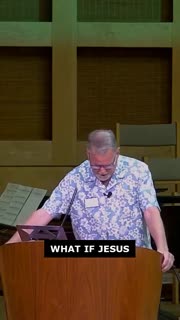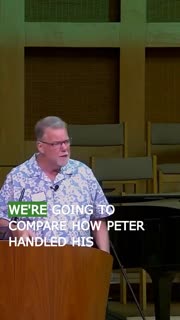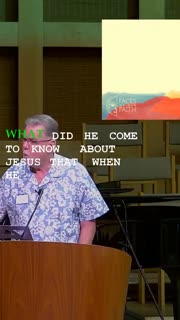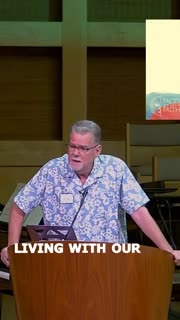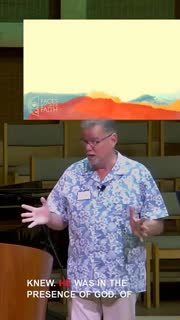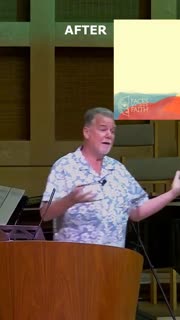Finding Peace and Restoration Through Peter's Journey
Summary
### Summary
Good morning, everyone. Today, we delve into the life of Peter, focusing on his failures and how he handled them. We all have moments of failure, and it's crucial to understand how to deal with them spiritually. Peter's story is particularly enlightening because it shows his growth over time. On the night Jesus was betrayed, Peter denied knowing Him three times, despite having sworn eternal loyalty. This was Peter's darkest moment, filled with fear and exhaustion, yet it was a profound betrayal of his friend and Savior.
We often struggle with guilt and shame, feeling that God might be disappointed in us. But Peter's story offers hope. After his betrayal, Peter had his first one-on-one interaction with Jesus by the Sea of Tiberias. When Peter realized it was Jesus on the shore, he couldn't wait to get to Him, jumping into the sea to reach Him faster. This reaction is surprising and beautiful, showing that Peter had come to understand something profound about Jesus' love and forgiveness.
In contrast, Judas, who also betrayed Jesus, ended in self-destruction. Guilt and shame can lead us down a path of self-destruction if we don't understand God's love and mercy. Peter's earlier reaction to a similar miracle was to ask Jesus to go away because he felt sinful. But three years later, after his greatest failure, he couldn't wait to be with Jesus. This transformation is rooted in Jesus' repeated message of peace and forgiveness.
Jesus' first words to His disciples after the resurrection were "Peace be with you." He showed them His crucifixion wounds and breathed the Holy Spirit on them, emphasizing that all is well. This message of peace is crucial for us to understand. Jesus' sacrifice on the cross covers all our sins, and His resurrection offers us new life and restoration. Peter was restored and commissioned to take care of Jesus' people, showing that our failures do not disqualify us from God's love and purpose.
Imagine what your life would be like if you truly believed in this peace and forgiveness. Jesus offers us peace, takes away our sins, and restores us. Let's take a moment to reflect on this and let it transform our lives.
### Key Takeaways
1. Peter's Darkest Hour and Our Own Failures: Peter's denial of Jesus during His darkest hour is a profound example of human failure. Despite his fear and exhaustion, Peter's betrayal was a significant moral lapse. This story encourages us to reflect on our own failures and understand that while reasons may explain our actions, they don't excuse them. True spiritual growth begins with acknowledging our shortcomings. [23:13]
2. The Weight of Guilt and Shame: Many of us struggle with guilt and a general sense of shame, feeling that God might be disappointed in us. This emotional burden can be overwhelming. However, Peter's story shows that these feelings are common and that Jesus offers us peace and forgiveness. Understanding this can help us move past our guilt and embrace God's love. [24:46]
3. Peter's Transformation: Peter's reaction to Jesus after his betrayal is a testament to his spiritual growth. Initially, Peter asked Jesus to go away because he felt sinful. But after his greatest failure, he couldn't wait to be with Jesus. This transformation highlights the power of understanding Jesus' love and forgiveness, which can radically change our response to our own failures. [31:09]
4. Jesus' Message of Peace: Jesus' first words to His disciples after the resurrection were "Peace be with you." This repeated message emphasizes that Jesus understands our struggles and offers us peace. His crucifixion and resurrection assure us that our sins are covered, and we can live in the peace He provides. This message is crucial for overcoming guilt and shame. [32:42]
5. Restoration and Commission: After his failure, Peter was not only forgiven but also restored and commissioned to take care of Jesus' people. This shows that our failures do not disqualify us from God's love and purpose. Jesus' sacrifice covers all our sins, and He calls us to continue His work of love and care in the world. This understanding can empower us to live out our faith more fully. [35:59]
### YouTube Chapters
[0:00] - Welcome
[20:10] - Introduction and Personal Story
[20:56] - Peter's Failure and Our Failures
[22:33] - Peter's Denial of Jesus
[23:13] - Reflecting on Our Own Failures
[24:46] - Struggling with Guilt and Shame
[25:55] - Peter's First Interaction with Jesus After Betrayal
[26:39] - The Miracle of the Fish
[27:43] - Peter's Urgency to Reach Jesus
[29:00] - Comparing Peter and Judas
[30:05] - The Impact of Guilt and Shame
[31:09] - Peter's Transformation Over Three Years
[32:12] - Jesus' Message of Peace
[33:03] - The Significance of the Crucifixion
[35:11] - It Is Finished: Jesus' Final Words
[35:36] - Peter's Restoration and Commission
[36:40] - Imagining a Life of Peace and Forgiveness
[37:28] - Closing Blessing
Study Guide
### Bible Reading
1. John 21:1-14 (NRSV)
> After these things Jesus showed himself again to the disciples by the Sea of Tiberias; and he showed himself in this way. Gathered there together were Simon Peter, Thomas called the Twin, Nathanael of Cana in Galilee, the sons of Zebedee, and two others of his disciples. Simon Peter said to them, "I am going fishing." They said to him, "We will go with you." They went out and got into the boat, but that night they caught nothing. Just after daybreak, Jesus stood on the beach; but the disciples did not know that it was Jesus. Jesus said to them, "Children, you have no fish, have you?" They answered him, "No." He said to them, "Cast the net to the right side of the boat, and you will find some." So they cast it, and now they were not able to haul it in because there were so many fish. The disciple whom Jesus loved said to Peter, "It is the Lord!" When Simon Peter heard that it was the Lord, he put on some clothes, for he was naked, and jumped into the sea. But the other disciples came in the boat, dragging the net full of fish, for they were not far from the land, only about a hundred yards off. When they had gone ashore, they saw a charcoal fire there, with fish on it, and bread. Jesus said to them, "Bring some of the fish that you have just caught." So Simon Peter went aboard and hauled the net ashore, full of large fish, a hundred fifty-three of them; and though there were so many, the net was not torn. Jesus said to them, "Come and have breakfast." Now none of the disciples dared to ask him, "Who are you?" because they knew it was the Lord. Jesus came and took the bread and gave it to them, and did the same with the fish. This was now the third time that Jesus appeared to the disciples after he was raised from the dead.
2. Luke 5:8 (NRSV)
> But when Simon Peter saw it, he fell down at Jesus' knees, saying, "Go away from me, Lord, for I am a sinful man!"
3. John 20:19-21 (NRSV)
> When it was evening on that day, the first day of the week, and the doors of the house where the disciples had met were locked for fear of the Jews, Jesus came and stood among them and said, "Peace be with you." After he said this, he showed them his hands and his side. Then the disciples rejoiced when they saw the Lord. Jesus said to them again, "Peace be with you. As the Father has sent me, so I send you."
### Observation Questions
1. What was Peter's initial reaction when he realized it was Jesus on the shore in John 21:7? How does this compare to his reaction in Luke 5:8?
2. In John 21:9-12, what did Jesus do for the disciples when they came ashore? Why is this significant?
3. According to John 20:19-21, what were Jesus' first words to His disciples after the resurrection, and what did He show them?
4. How did Peter's understanding of Jesus' love and forgiveness change from Luke 5:8 to John 21:7? [31:09]
### Interpretation Questions
1. What does Peter's eagerness to reach Jesus in John 21:7 suggest about his understanding of Jesus' forgiveness and love? [27:43]
2. How does Jesus' repeated greeting of "Peace be with you" in John 20:19-21 help us understand His message to the disciples and to us? [32:42]
3. In what ways does Peter's transformation from Luke 5:8 to John 21:7 illustrate the impact of Jesus' message of peace and forgiveness? [31:09]
4. How does the comparison between Peter's and Judas' responses to their betrayals of Jesus highlight different ways of dealing with guilt and shame? [29:00]
### Application Questions
1. Reflect on a time when you felt overwhelmed by guilt or shame. How did you handle it, and what can you learn from Peter's response to his failure? [24:46]
2. Jesus' first words to His disciples after the resurrection were "Peace be with you." How can you embrace this message of peace in your daily life, especially when you feel unworthy or burdened by past mistakes? [32:42]
3. Peter's transformation shows the power of understanding Jesus' love and forgiveness. How can you cultivate a deeper understanding of Jesus' love in your own life, and how might this change your response to personal failures? [31:09]
4. Consider the ways in which guilt and shame have affected your spiritual journey. How can you move past these feelings and embrace the peace and forgiveness that Jesus offers? [30:05]
5. Peter was restored and commissioned to take care of Jesus' people despite his failures. How can you apply this understanding to your own life, knowing that your failures do not disqualify you from God's love and purpose? [35:59]
6. Imagine what your life would be like if you truly believed in the peace and forgiveness that Jesus offers. What specific changes would you make in your thoughts, actions, or relationships? [36:40]
7. How can you support others in your community who are struggling with guilt and shame, helping them to understand and embrace Jesus' message of peace and forgiveness? [33:31]
Devotional
Day 1: Embracing Our Failures
Description: Peter's denial of Jesus during His darkest hour is a profound example of human failure. Despite his fear and exhaustion, Peter's betrayal was a significant moral lapse. This story encourages us to reflect on our own failures and understand that while reasons may explain our actions, they don't excuse them. True spiritual growth begins with acknowledging our shortcomings. [23:13]
We often find ourselves in situations where we fail to live up to our own standards or the expectations of others. These moments can be filled with regret and self-reproach. Peter's story reminds us that failure is a part of the human experience, but it is not the end of our story. By facing our failures head-on and seeking forgiveness, we open the door to spiritual growth and transformation.
Peter's darkest hour teaches us that our failures, no matter how significant, do not define us. Instead, they can be stepping stones to a deeper understanding of God's grace and mercy. When we acknowledge our shortcomings and seek God's forgiveness, we allow His love to transform us and guide us towards a more faithful and fulfilling life.
Luke 22:61-62 (ESV): "And the Lord turned and looked at Peter. And Peter remembered the saying of the Lord, how he had said to him, 'Before the rooster crows today, you will deny me three times.' And he went out and wept bitterly."
Reflection: Think of a recent failure in your life. How can you acknowledge it before God and seek His forgiveness and guidance for growth?
Day 2: Overcoming Guilt and Shame
Description: Many of us struggle with guilt and a general sense of shame, feeling that God might be disappointed in us. This emotional burden can be overwhelming. However, Peter's story shows that these feelings are common and that Jesus offers us peace and forgiveness. Understanding this can help us move past our guilt and embrace God's love. [24:46]
Guilt and shame can be paralyzing emotions that prevent us from experiencing the fullness of God's love and grace. They can lead us to believe that we are unworthy of forgiveness and that our mistakes have permanently separated us from God. However, Peter's story demonstrates that Jesus' love and forgiveness are always available to us, no matter how deep our sense of guilt and shame.
Jesus' message of peace and forgiveness is a powerful antidote to the weight of guilt and shame. By accepting His love and grace, we can release the burden of our past mistakes and move forward with a renewed sense of purpose and hope. Embracing God's forgiveness allows us to live in the freedom and joy that He desires for us.
Psalm 32:5 (ESV): "I acknowledged my sin to you, and I did not cover my iniquity; I said, 'I will confess my transgressions to the Lord,' and you forgave the iniquity of my sin."
Reflection: Identify a specific area of your life where you feel guilt or shame. How can you bring this to God in prayer and accept His peace and forgiveness today?
Day 3: Transformation Through Understanding Jesus' Love
Description: Peter's reaction to Jesus after his betrayal is a testament to his spiritual growth. Initially, Peter asked Jesus to go away because he felt sinful. But after his greatest failure, he couldn't wait to be with Jesus. This transformation highlights the power of understanding Jesus' love and forgiveness, which can radically change our response to our own failures. [31:09]
Peter's transformation from a man who felt unworthy of Jesus' presence to one who eagerly sought Him out after his greatest failure is a powerful example of the impact of understanding Jesus' love and forgiveness. This change in Peter's attitude shows that when we truly grasp the depth of Jesus' love for us, it can radically alter how we respond to our own shortcomings.
Jesus' love and forgiveness are not conditional on our perfection. Instead, they are freely given to us, even in our moments of greatest failure. By embracing this truth, we can experience a profound transformation in our relationship with God. We can move from a place of fear and unworthiness to one of confidence and eagerness to be in His presence.
John 21:7 (ESV): "That disciple whom Jesus loved therefore said to Peter, 'It is the Lord!' When Simon Peter heard that it was the Lord, he put on his outer garment, for he was stripped for work, and threw himself into the sea."
Reflection: Reflect on a time when you felt unworthy of God's love. How can you remind yourself of Jesus' unconditional love and forgiveness, and let it transform your response to your own failures?
Day 4: Living in Jesus' Peace
Description: Jesus' first words to His disciples after the resurrection were "Peace be with you." This repeated message emphasizes that Jesus understands our struggles and offers us peace. His crucifixion and resurrection assure us that our sins are covered, and we can live in the peace He provides. This message is crucial for overcoming guilt and shame. [32:42]
Jesus' message of peace to His disciples after His resurrection is a powerful reminder that He understands our struggles and offers us His peace. This peace is not just the absence of conflict, but a deep sense of well-being and assurance that comes from knowing that our sins are forgiven and that we are loved by God.
The crucifixion and resurrection of Jesus are the ultimate demonstrations of God's love and grace. They assure us that our sins are covered and that we can live in the peace that Jesus provides. By embracing this peace, we can overcome the guilt and shame that often weigh us down and live in the freedom and joy that God desires for us.
John 20:19-20 (ESV): "On the evening of that day, the first day of the week, the doors being locked where the disciples were for fear of the Jews, Jesus came and stood among them and said to them, 'Peace be with you.' When he had said this, he showed them his hands and his side. Then the disciples were glad when they saw the Lord."
Reflection: How can you actively seek to live in the peace that Jesus offers, especially in moments of guilt and shame? What practical steps can you take to remind yourself of His peace throughout your day?
Day 5: Restoration and Purpose
Description: After his failure, Peter was not only forgiven but also restored and commissioned to take care of Jesus' people. This shows that our failures do not disqualify us from God's love and purpose. Jesus' sacrifice covers all our sins, and He calls us to continue His work of love and care in the world. This understanding can empower us to live out our faith more fully. [35:59]
Peter's restoration and commissioning by Jesus after his failure is a powerful testament to the fact that our mistakes do not disqualify us from God's love and purpose. Jesus' sacrifice on the cross covers all our sins, and His resurrection offers us new life and restoration. This truth empowers us to live out our faith with confidence and purpose.
Jesus calls us to continue His work of love and care in the world, regardless of our past failures. By embracing His forgiveness and restoration, we can move forward with a renewed sense of purpose and commitment to serving others. Our failures become opportunities for growth and transformation, allowing us to more fully embody the love and grace of Jesus in our daily lives.
John 21:15-17 (ESV): "When they had finished breakfast, Jesus said to Simon Peter, 'Simon, son of John, do you love me more than these?' He said to him, 'Yes, Lord; you know that I love you.' He said to him, 'Feed my lambs.' He said to him a second time, 'Simon, son of John, do you love me?' He said to him, 'Yes, Lord; you know that I love you.' He said to him, 'Tend my sheep.' He said to him the third time, 'Simon, son of John, do you love me?' Peter was grieved because he said to him the third time, 'Do you love me?' and he said to him, 'Lord, you know everything; you know that I love you.' Jesus said to him, 'Feed my sheep.'"
Reflection: How can you embrace God's restoration and purpose for your life, despite your past failures? What specific actions can you take to serve others and continue Jesus' work of love and care in the world?
Quotes
### Quotes for Outreach
1. "The reason I want to do this is because I think all of us, some of the time, and some of us almost all the time are struggling with guilt, not feeling good about ourselves. Sometimes it's guilt. Sometimes it's just a general sense of shame that there's just something wrong with us. Maybe God is mildly fed up with us. Maybe, yeah, he'll let us into heaven because he's loving, but he must be kind of annoyed, must be kind of disappointed." [24:46] (31 seconds)
2. "He knows we're upset. He knows we're struggling. He knows we're hurting. He knows we're not doing all that well. Half the time. And so what does he say? Repeatedly in the Bible. But especially here. Look. Please be at peace. Be at peace. It's okay. It's okay. I've got this. So he says that." [33:03] (20 seconds)
3. "What if you actually believe that God himself in Christ is offering you peace. He really is. What if he is. Just I want us to imagine that. What would it be like if he's repeatedly offering you peace. He's trying to make a point. I would like you to have peace. What if we believe that." [36:40] (21 seconds)
4. "What if Jesus is actually stressing his work on the cross takes away the sin of the world and takes away your sin. It's gone. It is white as snow. Even if it was scarlet. And what if it is true that Jesus restores and he provides for you he feeds you and that Jesus loves you." [36:40] (23 seconds)
### Quotes for Members
1. "We're going to compare how Peter handled his failure. When he betrayed Jesus three times, if you remember the story, and compare that to how Judas handled betraying Christ, who did it very differently. I'm going to follow up this thing if I wander around. And we'll also compare how Peter handled his failing of Christ and compare it with how Peter dealt with his own sinfulness three years earlier when he was first being crucified." [20:56] (34 seconds)
2. "What did he come to know about Jesus that when he had really blown it, he didn't cower away from him. He didn't keep his distance. He didn't do like Judas and self-destruct. He ran to Jesus. What did he know? What did he learn? Because this is very different from how Judas handled guilt, isn't it?" [29:00] (28 seconds)
3. "Living with our failures where there's no awareness of God's love and mercy and understanding and kindness and forgiveness leads us to self-destruct one way or the other. Maybe it's dramatic like Judas. Maybe it's just giving up, tuning out and watching TV. Maybe it's just drinking way too much. But those seem to be dramatic options." [30:05] (31 seconds)
4. "Peter knew. He was in the presence of God. Of holiness. Of wonder. He just fell on his knees. And in Luke 5.8 it says this. But when Simon Peter saw it. This miracle. He fell down at Jesus' knees saying, go away from me, Lord. I am a sinful man. Just the opposite response of three years later. Where he knows he's sinful. And again, some of us. It's not just guilt about a particular thing that we've done. But there's a sense of shame." [31:09] (36 seconds)
5. "Peter. After this big failure is restored and commission and given something good from God to do just like you. Right. Just like me in our failure. It doesn't disqualify you. He's like peace be with you. My crucifixion. My suffering covers all of this and you're commissioned to go go and bring love into the world." [35:59] (23 seconds)
